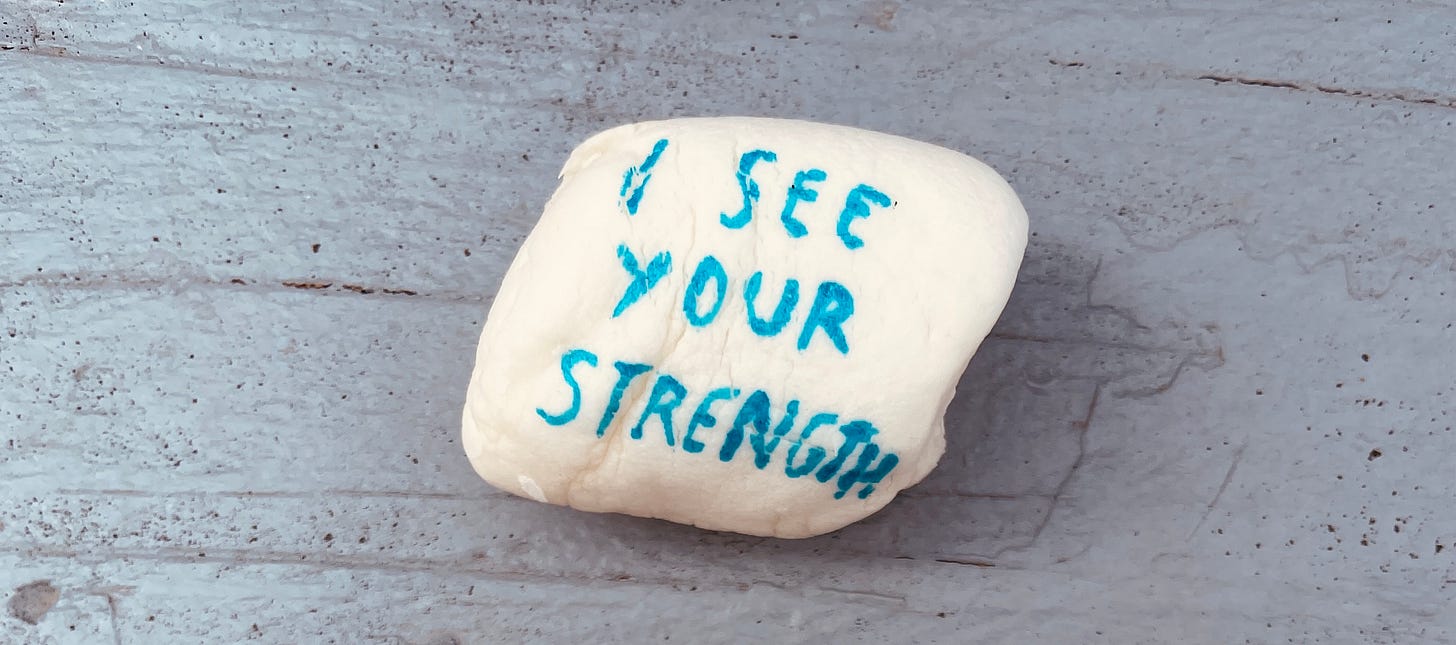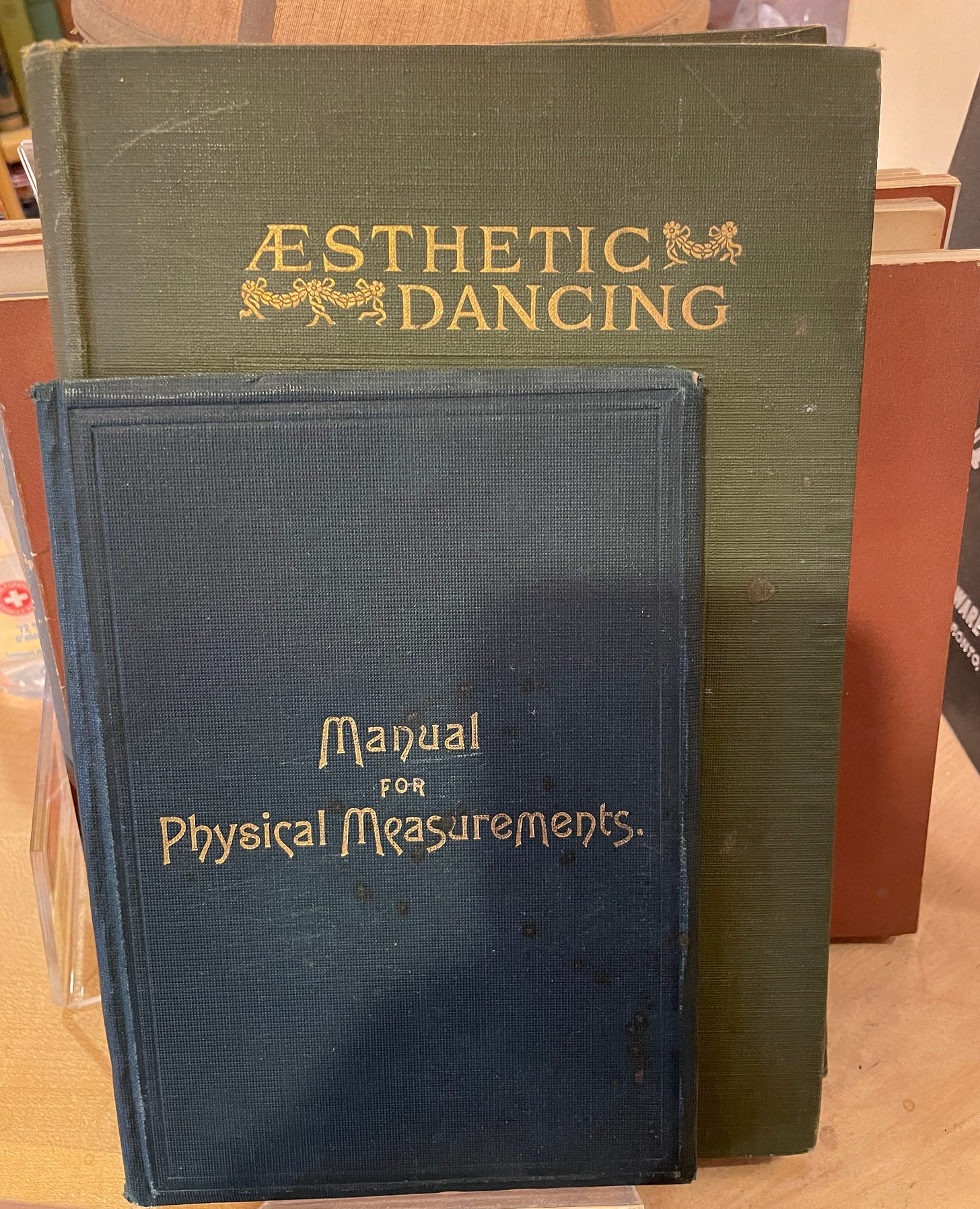Can you do hard things?
(Is the wrong question) Of course you can.
On the eve of my daughter’s bat mitzvah last week, I was thinking about her namesake, my grandmother, Helena. I think of my grandmother most pangingly when I see my daughter interacting sweetly with older people, how my tiny Bubby would have loved to know this gorgeous, thoughtful creature, with curls for days and a smile for everyone. My second thought in this chain always goes to how different Helena the elder’s life was from the life my daughter is inhabiting. My grandmother’s earthly experience was tough — she survived concentration camps and the loss of most of her family, made her way to a new country, and then another new, much colder country, found a job, raised my dad. My daughter’s life, though not without the challenges of modern adolescence and gratuitous slushie consumption, is mercifully free of such horrors and trials, as is mine. You can see what the third thought is going to be now – Could we have endured? My answer was once, most assuredly, no. It has changed.
I contemplated that third thought anew after reading this misguided but compelling piece in The Guardian, about the ascetic Simone Weil (I have always preferred my Simones de Beauvoir, so I’ve been late to this second Simone). The author, Justine Toh, writes, “the climate crisis calls for a radical rethink of our cushy, carbon-heavy lives and our collective willingness to make sacrifices for future generations. But raised in a world of comfort and convenience, I get annoyed when there’s no wifi. I don’t do sacrifice. I need someone to show me how.”
Toh’s argument is that we ought to look to Weil, the near-saintly French writer and philosopher, to understand how to endure hardship, as that is what the climate crisis will demand. I disagree with the premise. And I disagree with the assessment of humanity. It’s not about sacrifice in the way that Toh contends, and yes, we can do hard things. Let’s unpack these two things backwards, in high heels that we could totally live without.
This idea that we are weak, beholden to McMansions, is such a house of cards:
Still, she gives us, kids of the comfortable classes, some hope. We have ideals but perhaps we don’t quite know – as she did – how to suffer for them. Even if we back urgently cutting emissions, we don’t know how to evict ourselves from what the historian Dipesh Chakrabarty calls “the mansion of modern freedom [that] stands on an ever-expanding base of fossil fuel use.
While it’s true that many of us do not suffer (many, many do!), it’s not true that we don’t know how to suffer, don’t have capacity for suffering. My grandmother didn’t do HIIT workouts in preparation for the invasion of her country. People do hard things when hard things come at them. We’re malleable.
In the early part of my life, I thought myself a super soft person, incapable of pushing myself to places of discomfort, and lucky that the places I was able to push myself to were elevated enough to ensure modest success. It was only later in life that I began (thanks to Carol Dweck, Angela Duckworth, and my improved iron levels) to question that foundational belief. I birthed my daughter sans meds, I ran marathons for fun, I lost people I loved, I endured Paw Patrol: who says I can’t do hard things when the moment demands?
The better question is why this framing? Why is change, in the name of reduced emissions, positioned as sacrifice? A fossil-free future is a better one — we’ll breathe easier, live healthier, noise pollution will go down, climate calamity will be avoided. It’s folly to assume we can’t adapt. The whole framing of sacrifice is a myth. This is not to suggest that many of the conveniences of modern life are not huge gamechangers (medicine, cozy homes, portable milk frothers), and that climate instability threatens essential supply chains. BUT, a fossil-free life is often positioned as some sort of worst extreme — we will live in caves wearing burlap sacks. Rather, we will not buy 70 pieces of disposable fast fashion, we won’t spend long hours commuting by car, we’ll travel with a little more intention. It’s not even degrowth, it’s just living thoughtfully. And it’s not about giving up, so much as transitioning to a new (and in some ways old!), truly better way.
Toh again:
The point is: when it comes to giving up things, we need to start somewhere and do something. I may not feel built to make sacrifices, but then neither was Weil. A relatively privileged child, she could have remained comfortable. But she didn’t, which makes her our patron saint for pushing us out of our comfort zones. Even if the sacrifices we make on behalf of the planet never fully imitate her, who knows? Deciding to do without some creature comforts might yet change both us and our world.
We do need to start somewhere, doing away with the big emitters that are destroying our hope for a flourishing future. We aren’t going to give up heating our homes —we’re just going to heat them without fossil fuels, and with heat pumps. We must get governments, business, and people to do the big important things, and fast. We must stop self-flagellating about single-use plastic at the grocery store, and fix the entire system. We must make bold choices to create new norms, and then show that these new (walkable, meat-reduced, community-minded) norms are just plain delightful. We must not just allow for the possibility of change, but will it into being, because it’s very much within all of us to make it so. Am I beating my chest, wind in my hair, fuzzy gelled spotlight shining upon me as I write this? Mayhaps.
But I’m tired of the ‘I couldn’t do this’ mentality. Because it’s patronizing. To let the planet burn on the presumption that we, the people alive now, cannot rise to the occasion, is such a risibly terrible frame. And this is not about hustle or the treacly platitudes of you-go-girl culture. It’s just what is. Let’s define humanity not by its susceptibility to the illusory softness of an overacquisitive lifestyle, but by its potential for greatness.
This planet
How do you see yourself? Hard/soft/medium firm? Let me know.
Last planet
Apologies for the delay since the last planet (see aforementioned life milestones). I’m still catching up on replies. Thank you, Nett Positive, for this beauty. I aspire to make things ‘sort of fun.’
As always, thank you for your commitment and communications. I am an organic farmer, out in the field nearly non-stop and have found a new climate activism, largely through the mentorship of my cat co-worker. I take breaks and instead of working the list, I sit and admire the marvels of the earth, really dig into the gratitude for its marvels and my ability to witness it. I call it strolling, not scrolling. It leaves me more connected to why I am doing this.
Take care of yourself. You are doing such important work and making it sort of fun.
Stuff
Gobsmackingly Bananas, or 1.5 is outta reach
Chris Hatch with the best take on Gobsmackingly Bananas I’ve read. We’re in unprecedented, underreported territory. His last para ties to my screed above. We can handle hard truths and difficult things.
Climate scientists (and journalists) are underestimating people. If you treat people like children who can’t handle the truth, they will behave like children. Like teenagers, actually, wasting time like it’s in endless supply. Yes, there are plenty of people who prefer denial. But I bet just as many want the truth, painful as it is. We deserve a shot at rising to the occasion.
Or, not so much? Let’s proceed as if it’s the former, and hope for the latter.
Want a climate-aware therapist?
I love this, from friendVP, Heather Mak:
Speaking to a climate-aware therapist. This week, I tried out therapy for the first time with a psychotherapist who is trained to deal with the mental health burdens arising from climate change. I found it to be a valuable discussion, as someone who immediately dives into action trying to solve climate issues, to step back and pause, "be", and "feel", instead of "do". If it's of interest, here's links to climate-aware therapists in your area in North America, and the UK. Additionally, for those who do not have access to health benefits, the Climate Psychology Alliance also runs Climate Cafes.
Journalism STILL isn’t covering climate enough
Duh, but the editor of the Columbia Journalism Review is leaving his post to try to change this.
Predictable dishonest?
This New Yorker piece on Dan Ariely is also gobsmackingly bananas.
Peace and strength
I love the translation of the session tonight that my fave musician Noga Erez is convening on Zoom to deal with the horror of what is happening in the Middle East right now: addressing how our soul meets this impossible situation. How does a soul meet an impossible situation? Wishing an end to all of this now.
We watched
It’s a lot for my kids, but Reservation Dogs is one of the most revelatory show on television, and truly beautiful. Today is Indigenous Peoples Day. This season poses a lot of hard questions, and is worth wrestling with, as we work to create a citizenry that understands this horrible history. Spoilers.
We marched
And Toronto came back, in full, beautiful force:
People dancing
We took our kids to two incredible music docs, both of which my son fell asleep in/grumbled about through his massive bag of popcorn. But, you know, building character, beat by beat! Doc one was the incredible Elephant 6 Documentary. This music shaped me — the musicians in all these bands were small-town weirdo polymaths who showed me there was life beyond suburbia — and the documentary is perfection.
AND, the remastered Stop Making Sense is wonderful, and worth seeing in theatres, preferably with besuited dancers, and not grumbly ten year-olds.
Thank you for reading. Please always let me know how to make this newsletter better.
Hope you are happy, healthy, safe, and aware of your own strength!
Sarah








Thanks Sarah for your stories and prompting. So important your reminders and encouragement to reflect upon ourselves and our places in the rapidly changing environment. As you quite and mention, yes we all can do hard things when called on. Sometimes it starts at home where we learn about community in family. Sometimes it works, other times it can be quite traumatic. But we can all do something and really need to reflect and question ourselves, just how. (so again, thanks for your prompts) As well trained followers of society, diligently fed by advertising and higher layers of authority, most have handed over their power and initiative to those who say they are taking care of business; the same people who tell us that we are the polluters and not the companies which need to sell us their stuff. Sort of like white mice hypnotised by a snake looking us in the eye. Love your writing and drawings
Not sure if this is true or not but I heard that Obama had a plaque on his desk that said "Hard things are hard" 🤣❤️